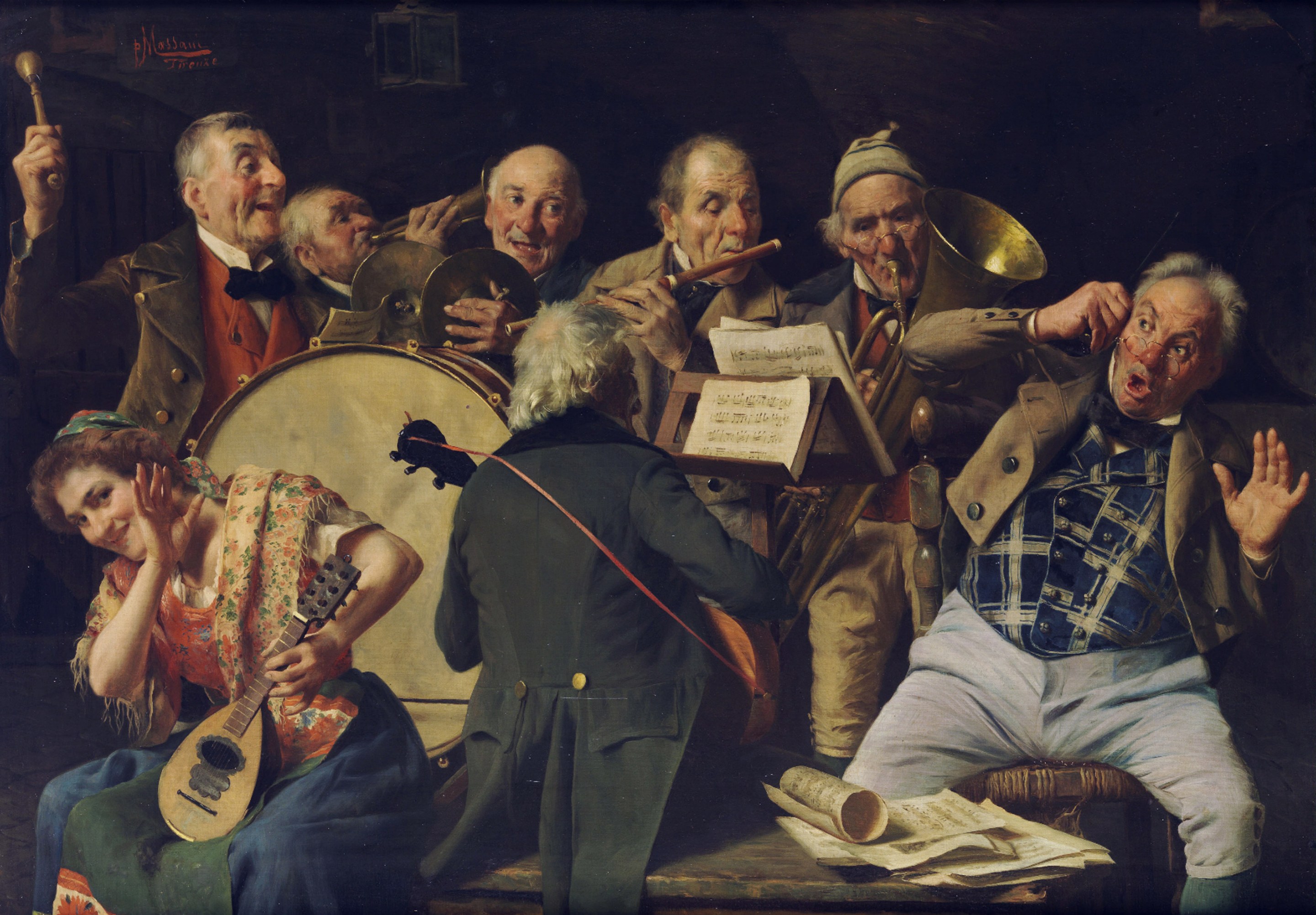At some point in the thick of the pandemic, I became briefly obsessed with a silly-seeming online controversy over what is known as the double-beat theory. The argument concerns classical music, which normally would’ve been enough for me to move along, prestissimo, but those were not normal times. By the third or fourth video I watched, I was fully invested in an argument I barely understood about a kind of music I rarely consumed.
The stakes couldn’t have been lower. The double-beat discourse, such as it was, unfolded in the nested replies of comments sections, one side sneering at the “single-beaters,” the other invoking flat-earthers, each lamenting the other’s tendency toward ad hominem attacks, and on and on and on. Polemics were delivered via YouTube—monologue after self-shot monologue that seemed to borrow its mise en scène and cast from an old VHS dating service, the men drifting in and out of focus on their farty ergonomic chairs, all the accents of the Western Europe professoriat on hand, each finding its own exciting path through words like “ludicrous" and “contemptible.”
None of it seemed to mean anything of consequence, really, and eventually I moved on to other diversions. But I was wrong. I can see—no, I can hear it more clearly now. The double-beat theory means nothing short of everything.
OK, the double-beat theory. It goes like this: Because of a longstanding misapprehension about what constituted a full metronome beat in the time of Beethoven and other composers in the Western canon, performers have inherited a tradition of playing a great deal of classical music twice as fast as was originally intended. The theory holds that a single beat historically comprised two clicks of the metronome, not one, which is what musicians are taught today. This suggests that, under the prevailing ideas of tempo, any performer wishing to remain faithful to Beethoven’s composition of the Hammerklavier Sonata, Op. 106, would need to halve the notorious metronome markings for the first movement—slowing down the hand-crampingly fast 138 beats per minute for the half note to a nice, leisurely 69.
Here’s a version someone sped up to match the 138. (You’re not going to find many examples of concert pianists actually playing this fast.)
And now here’s a double-beater’s rendition:
The guy playing in the above clip is Wim Winters, a nebbishy, Belgian-born apostle of the double-beat theory. He is a keyboard adept—piano, organ, clavichord—who approaches musical reconstruction, in his words, as a “musician who from a very practical standpoint tries to understand the score.” The theory has existed in some form since at least 1980, when a music theorist named Willem Retze Talsma published his polarizing monograph in German about the "demechanization of music.” Talsma was inveighing against a destructive virtuosity that had reduced pianists to the lot of an industrial worker, consigning them to eight-hour shifts at the bench. Winters once counted himself among the skeptics. But by the turn of the century he had been converted—seduced in part by the pleasures of the slower music itself. And to the humanism of Talsma’s arguments, Winters added some bits from the historical record: instructions for using an early metronome, for instance, that were published in a newspaper in 1816. They read: "[E]ach SINGLE tick forms a part of the intended time, and is to be counted as such; but not the two beats produced by the motion from one side to the other."
Today, Winters calls the metronome “our time machine.” On his well-populated YouTube channel, Authentic Sound, he serves up performances of canonical works at their “original" tempos, interspersed with videos in which he addresses his critics with the besieged yet assured air of a misunderstood prophet.
Winters argues in many registers at once. He is a man of science: Drawing on Thomas Kuhn, the philosopher of science, he declares gassily that paradigm shifts always originate outside the system, with mavericks such as himself. He is a true believer: He speaks of the double-beat theory in the language of revelation, insisting that “all these things come together once you open your mind [to] it. You will start seeing things.” He is a historian and an aesthete: He claims the documentary evidence supports the theory, but that, even if it didn’t, the slower playing would be preferable for the way it cracks open the music, the way it deepens the color. He is a populist: By restoring the composer’s prerogative and slowing the music down to playable levels, he’s bringing it “back to where it belongs—with the amateur.” Think as well of all the poor working musicians who will be spared the physical and psychological miseries of failing to play the Rach 3 or Liszt’s La Campanella. He is an unabashed elitist, too: By tethering a piece more tightly to the will of its composer, he is disempowering not just the “charlatan" performers but the philistine audience that seems always to demand them. Indeed, he is, in his own half-joshing estimation, the potential savior of classical music, creating a market for a whole new set of interpretations of the canon.
If Winters is grandiose about his contributions, he is at least modest on the level of epistemology, with his pleasing insistence on historicizing the act of listening itself. A music listener in the era of jet travel, after all, experiences time differently from one in the era of the horse-drawn carriage. One thing the double-beat theory has over some of the musical conspiracies to which it’s been compared is that it operates on the sensible premise that how and what we hear are not universal, transhistorical givens, but products of specific social contexts. The cranks pushing the 432 Hz tuning business, by contrast, insist that there is some natural frequency at which humans most pleasurably hear music—but that our standard tuning for A above middle C (440 Hz) is the result of some conspiracy of … well, take your pick, but here’s where someone usually mentions the Rothschilds, if you catch their drift. (The LaRouchies love this one, by the way.)
I am in no position to litigate any of this for you, on a musicological or an aesthetic level. To these ears, trained on the single-beaters’ tempo regime, the reconstructions seem to sag off the piano—the music constantly going dead in the felt of the hammers, producing what Susan McClary has called, in another context, a state of “suspended animation.” There is no shortage of people who feel likewise. A fairly representative comment: “honestly the only proof anyone needs is one listen to Wim Winters's rendition of any Beethoven sonata. They're clearly not supposed to be this comically slow!” Debunkers abound on Reddit, bird-dogging his playing, his historical evidence, his overall bad vibe. The most damning of those criticisms, I think, is that, for all the scattered documentary evidence Winters marshals to support the theory, he does not offer anything from the pivotal moment that his theory presupposes: the moment the musical consensus flipped irrevocably from the double-beat interpretation of the metronome to the single. Somehow, somewhere in the 19th century, it just happened, apparently without any fuss from some of the fussiest cultural arbiters who have ever lived.
The bit-by-bit takedown isn’t really what interests me, though. The evident wrongness of the theory alone can’t quite explain the temperature of the responses. I saw an exchange in which a message-board poster wondered why people were treating Winters with such open contempt. Came the reply: “Same reason we make fun of people who believe in aliens... because for every idiot who believes something stupid, is another ten who hang on his every word. I mean, look at how many idiots believe that music in A=432hz is better than the original. It's NOT!!! It's how religion started.” Someone has made a playlist on YouTube called “The Double Beat Whole Beat Pseudo-Theory Debunkathon Smackdown of Wim Winters the Cultist Charlatan.” There are 72 videos in this playlist. That’s where I found a video from a French critic of Winters. It’s entitled “I have been shadow banned by Wim Winters," and in it he complains, with barely suppressed rage, “This is a move of a dictator."
Religion! A dictator! Clearly something is at work here beyond a few critics at arms over their musicological pride. I would like to offer a crackpot idea of my own. Start with the metronome itself, patented in 1815, when the development of music technology was beginning to reflect “a will to construct a universal language operating on the same scale as the exchanges made necessary by colonial expansion: music, a flexible code, was dreamed of as an instrument of world unification, the language of all the mighty.” That’s from Jacques Attali in his infuriating and illuminating Noise, describing the entrenchment of Western music as the music—the global default, legible to all across space and time and absorbed into the natural order.
What the double-beat theory profanes against is the taken-for-grantedness of the Western tradition. “Our” inheritance, it hints, is built on flimsier and falser grounds than we might like to believe. Sitting on my couch in the middle of a pandemic—one eye on a screen, the other on the world-as-it-was falling irretrievably away outside my window—I was primed, if not for the theory itself, then at least for its core implication: The taken-for-grantedness of things can no longer be taken for granted.
Attali also writes that music has a prophetic quality. It sounds like one of those airy things you imagine French intellectuals of the ’60s saying at the Sorbonne to get girls into bed. But he’s onto something. The very idea of a music entails ordering noise into codes of one kind or another, a kind of prepolitical consensus among people, subject to constant revision, the codes shifting and moving when the people do. He’s saying that coming social forms can be heard before they appear in the political life of a society.
Maybe that helps explain the rancor over the theory—that mad dash to the ramparts of a musical canon to repel the guerrilla revisions of the double-beaters. Was there something almost existentially destabilizing about their claim? Were the single-beaters hearing, in those halved tempos, an echo of a political future in which the wobbling Western order finally collapses?
The double-beaters themselves are no real threat, surely. They will likely go the way of other blessed cranks. Maybe their slow-play prescriptions will eventually be absorbed as a practical alternative in the emerging age of unarresting background music. Maybe they’ll just be forgotten. But there will be more like them—so many more—rushing to the fissures of the crumbling old citadel of the West. You can hear them already, can’t you? Some will be crackpots, some genuine revolutionaries, some a bit of both—all brave, in their way, for daring to say that what everyone thought was two was, in fact, one.






